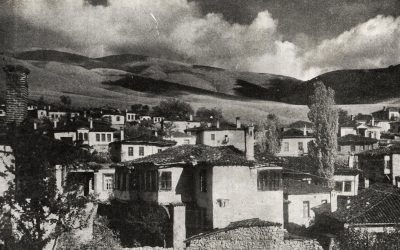The first round of Greece’s 2023 national elections took place two weeks ago, and the second round is still pending. This race not only holds significant importance but also encourages us to reflect upon the pivotal election moments that have shaped the course of Greek history over the past two centuries. Which milestones in Greek electoral history have left an indelible mark and shaped the trajectory of the nation? We will delve into this history through two articles. The first article will cover the milestones in Greek electoral history starting from the first elections in 1844 and spanning through those of 1920.
From Political Tradition to Modernity: The First National Elections of 1844
Following the Revolution of 1843, thanks to which the Greek Kingdom acquired constitutional monarchy, the Greek political system saw the emergence and solidification of political schemes that became known as the English, French and Russian Party. These were the outcome of processes that had taken place during the Greek Revolution (1821-1830) and each one was supported by the three Great Powers of that time, Britain, France and Russia.[1] The power of these parties was not only based on these relations, but also on their ability to associate with interest groups, factions and kinship networks which had strong socio-political foundations, through a patronage system.[2] Occassionally, through these correlations, the parties abetted local disorders (e.g., revolts) so that they could have political benefits.[3]
The French Party consisted of a wide range of social groups, under the leadership of politician Ioannis Kolettis.[4] The English party had fewer connections at a local level and targeted a close circle of highly educated people close to administration.[5] Its leader was politician Alexandros Mavrokordatos. Both parties aimed at an institutional and constitutional modernization of the state.[6] On the contrary, the Russian party, with revolutionary hero Theodoros Kolokotronis and A. Metaxas as its leaders, focused on the Christian Orthodox principles, reaching a wider mass audience.[7]
Having secured some fundamental political rights through the first concession of a constitution in 1844, the first national parliamentary elections were held between May and August 1844 by the government of Mavrokordatos.[8] The pre-elective period was turbulent, as the opposing parties complained about endeavors of adulteration.[9] The elections proceeded through ballot papers and a “first-past-the-post” voting system, while only men over 25 years old had the right to vote.[10] Despite the various accusations, the coalition between the French and the English Party won the elections, and Ioannis Kolettis became Prime Minister.[11] His governance lasted for three years and was accused of demagogism and violation of the constitution.[12]
Undoubtedly, the first Greek national elections were not characterized by a big political change or even a full-fledged and legitimate electoral process. However, these elections took place within a context in which Greek traditional political powers were being assimilated into a modern political system.[13] It was then that traditional Greek society started to understand and accept the modern institutions that would lay the groundwork for the upcoming developments.[14] For these reasons, the elections of 1844 are considered to be one of the milestones in Greek electoral history.
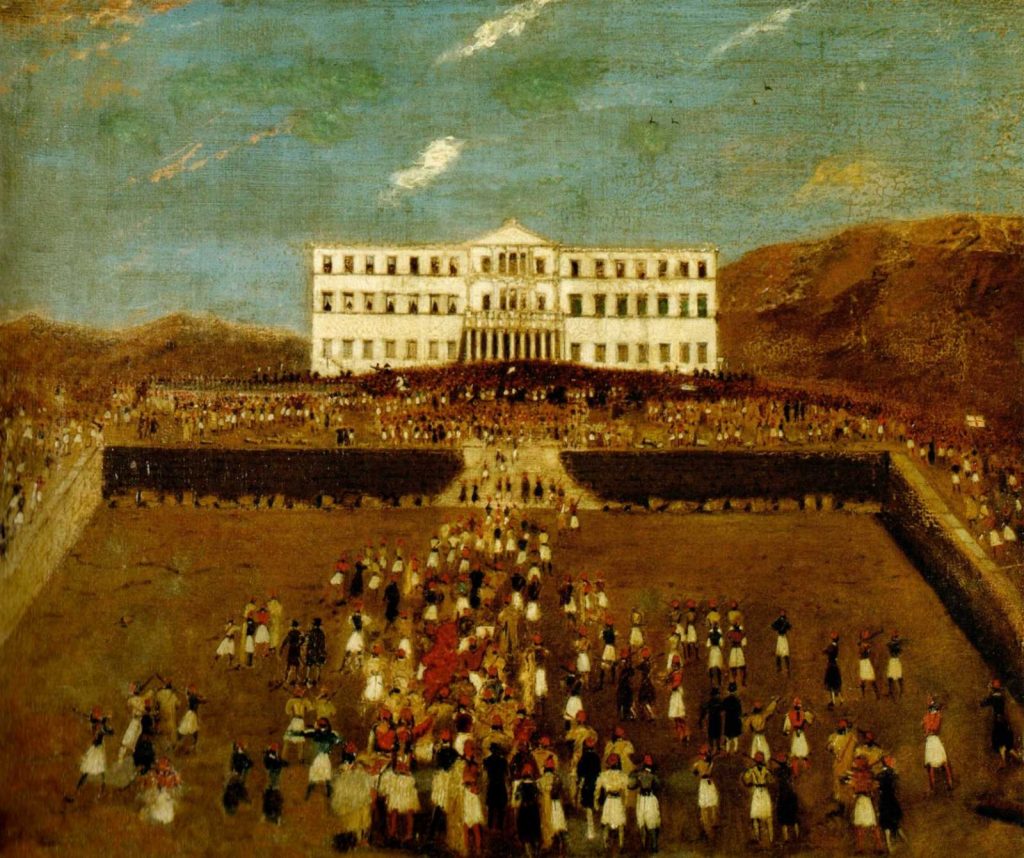
On Greek Ancestry you will find voter lists covering the whole country and spanning from the 1840s through the 1930s! Click here to start exploring and discover your family’s role in Greek electoral history!
Shielding Democracy: the Elections of 1875
Despite the improvements in the operation of the democratic system, especially after the 1864 constitutional reform, the abusive interventions of King George I, the direct appointment of minority governments and general political upheaval were permanent characteristics of the period.[15] Still, the elections that took place on July 18-21, 1875 by the appointed government of Charilaos Trikoupis brought rapid changes. Trikoupis failed to win the elections, as he managed to elect only twenty five representatives.[16] Most of the voters, who were men over 21 years old, voted for the political party of Alexandros Koumoundouros, electing eighty representatives.[17] However, Trikoupis’ policies prevailed, as for the first time, the King committed before the parliament to appoint a prime minister who would have gained the “declared confidence” of the representatives of the nation, as indicated by Trikoupis.[18] Based on this principle, the King would be thereafter obliged to mind the decision of the country for the formation of a government.[19] Accordingly, he would not no longer be able to appoint minority governments based on his personal preference, a practice that created continuous political instability in the past.[20]
The significance of the elections of 1875 does not lie in an immense electoral shift, as Trikoupis would prevail over Koumoundouros later, in 1881, establishing a solid majority government.[21] Instead, this is one of the milestones in Greek electoral history, as it marked the beginning of a new era, during which the democratic and parliamentary principles were being consolidated and safeguarded. At the same time, a new period of political modernization was being inaugurated, with the presence of statesman Charilaos Trikoupis and a two-party political system with modern characteristics, through Trikoupis’s opposition to his political competitor, Theodoros Diligiannis.[22]
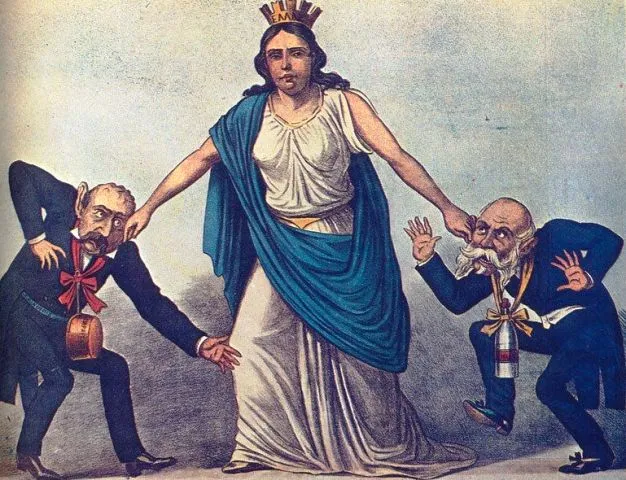
The Elections of the National Schism: 1915 & 1920
The Elections of 1915
The first decades of the 20th century were characterized by the dominance of Eleftherios Venizelos in Greek politics.[23] The triumph of the Liberal Party (Komma Fileleftheron) under his leadership in the elections of 1910 and 1912 brought decisive changes, as new political leanings and social classes were represented in the parliament (e.g. liberal, pro-socialist).[24] Also, new political figures started to appear, and focus was given to political groups rather than to individuals.[25] When it comes to voting processes, the little sphere ballots which had been used during Trikoupis’s era were replaced by the common ballot paper after 1923.[26] In this way, the voting criteria became purely political and not personal.[27]
DID YOU KNOW? The leaden sphere ballot was introduced in 1864 due to illiteracy in Greece. Each candidate’s ballot box was divided into two parts, distinguished by colors. A big “YES” was written on the white section and a big “NO” on the black one. On the top of the box there was a tube with a round hole. The voter took a bullet, raising his hand to show the electoral committee that he held only one, then approached the box. He dropped the bullet through the hole, choosing “yes” or “no”. Rejecting a candidate meant dropping the bullet in the black section, hence the expression “they blackened him“. Devoted supporters of a candidate sometimes bit the bullet leaving teeth marks to demonstrate their devotion to him. This is where the Greek expression “I cast it bitten!” comes from.
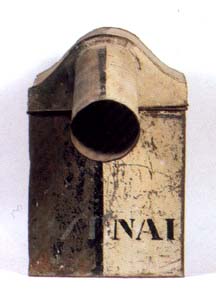
The double electoral race of 1915 was the riskiest, as it took place within the historical conjuncture of the First World War and Venizelos’s concurrent effort to expand the borders of the Greek state.[28] After a series of disagreements between Venizelos and King Constantine I over Greece’s participation in the war, in February 1915 the latter appointed Dimitrios Gounaris as prime minister, removing Venizelos.[29] Not obtaining the “declared confidence” vote of the parliament, Gounaris announced national elections on May 31, 1915. The liberal party prevailed over the party of Ethnikophrones, with 186 out of 316 seats (approximately 54% of the electorate). In these elections, it is estimated that 687.000 people voted out of the 1.300.000 registered voters.[30]
The political turbulence continued for the rest of 1915, as Venizelos and the King did not manage to reach a compromise again, resulting in the abdication of Venizelos’ government for the second time.[31] In the elections of December 6, 1915, the Liberal Party decided to abstain, considering the dissolution of the parliament as unconstitutional.[32] Similarly, only 334.945 people went to the polls.[33] The National Schism was born in those politically turbulent years and would soon result in violence and an civil-war atmosphere. Two years later, in 1917, after King Constantine left the country, the parliament formed by Venizelos was reconvened and operated again.[34]
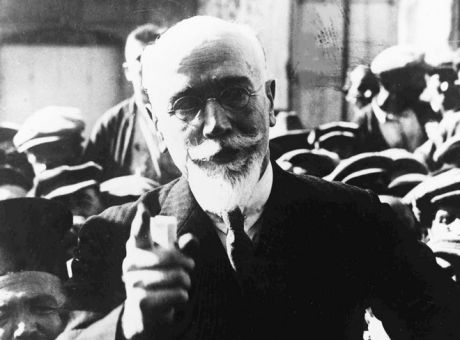
The Elections of 1920
It has been argued that in terms of consequences, the elections of 1920 were the most critical milestones in Greek electoral history to that time.[35] During the First World War (1914-1918), in which Greece had officially been involved, Venizelos reestablished his government and realized some major national assertions (the Greek Army arrived in Smyrna in May 1919).[36] However, despite the gradual actualization of the “Megali Idea” irredentist vision, with the annexation of Thrace in May-June 1920 and the signing of the Treaty of Sevres in August of the same year, the sociopolitical reality was different: the 8-year belligerency, the human sacrifices of the war and the dissatisfaction with the authoritarian governance aiming to civil modernization resulted in the rejection of Venizelos’ policies.[37] In the fateful elections of November 1920, the “United Opposition” prevailed, while not even Eleftherios Venizelos himself managed to be elected.[38] Following Venizelos’s defeat, the country was entering a dark era marked by the Asia Minor Catastrophe and the end of millennia of Greek presence in Asia Minor.
About the Author
Maro Rempoutsika studied history at the University of Athens and the University of Groningen. She works as a research assistant at Greek Ancestry.
[1]Domestic Policy [1833-1897], ime.gr, Accessed May 24, 2023, http://www.ime.gr/chronos/12/gr/1833_1897/domestic_policy/people/03.html
[2] Domestic Policy, ime.gr
[3] Domestic Policy, ime.gr
[4] Domestic Policy, ime.gr
[5] Domestic Policy, ime.gr
[6] Domestic Policy, ime.gr
[7] Domestic Policy, ime.gr
[8] San simera.gr, Accessed May 24, 2023,
[10] San simera.gr
[11] San simera.gr
[12] San simera.gr
[13]Domestic Policy [1833-1897], ime.gr, Accessed May 24, 2023, http://www.fhw.gr/chronos/12/gr/1833_1897/domestic_policy/index.html
[14] Domestic Policy, ime.gr
[15] Domestic Policy, ime.gr
[16] Ellinikes Vouleutikes Ekloges 1875 – Wikipedia, https://el.wikipedia.org/
[17] Ellinikes Vouleutikes Ekloges, https://el.wikipedia.org/
[18] San simera.gr, Accessed May 30, 2023,
[19] Biographies-Oi Megaloi Olon ton Epohon, vol.4, Domi Publications, p.172-189
[20] Biographies, 172-189
[21] Biographies, 172-189
[22] Theodoros Deligiannis was a Greek politician. As the leader of the Nationalist Party, he was instrumental in establishing the two-party system that defined the era, alongside the New Party led by Ch. Trikoupis.
[23] Il. Nikolakopoulos, “I Ekloges 1910-1920” in Istoria tou Neou Ellinismou 1770-2000, vol.6, ed. B. Panagiotopoulos (Athens: Ta Nea & Ellinika Grammata, 2003), p.31
Eleftherios Venizelos was a Greek statesman, recognized for his efforts in expanding Greece’s territory and championing liberal-democratic ideals. He held the position of prime minister for more than twelve years. Spanning over eight terms from 1910 to 1933, his enduring influence on Greek politics earned him the title of “The Maker of Modern Greece.”
[24] Nikolakopoulos, “I Ekloges”, 32-34
[25] Nikolakopoulos, “I Ekloges”, 32-34
[26] Nikolakopoulos, “I Ekloges”, 31
[27] Nikolakopoulos, “I Ekloges”, 31
[28] Nikolakopoulos, “I Ekloges”, 35-36
[29] Nikolakopoulos, “I Ekloges”, 35-36
[30] Nikolakopoulos, “I Ekloges”, 35-36
[31] Nikolakopoulos, “I Ekloges”, 35-36
[32] Nikolakopoulos, “I Ekloges”, 35-36
[33] Nikolakopoulos, “I Ekloges”, 35-36
[34] Nikolakopoulos, “I Ekloges”, 35-36
[35] Nikolakopoulos, “I Ekloges”, 36
[36] Nikolakopoulos, “I Ekloges”, 36 – 38
[37] Nikolakopoulos, “I Ekloges”, 36-38
[38] Nikolakopoulos, “I Ekloges”, 36-39



